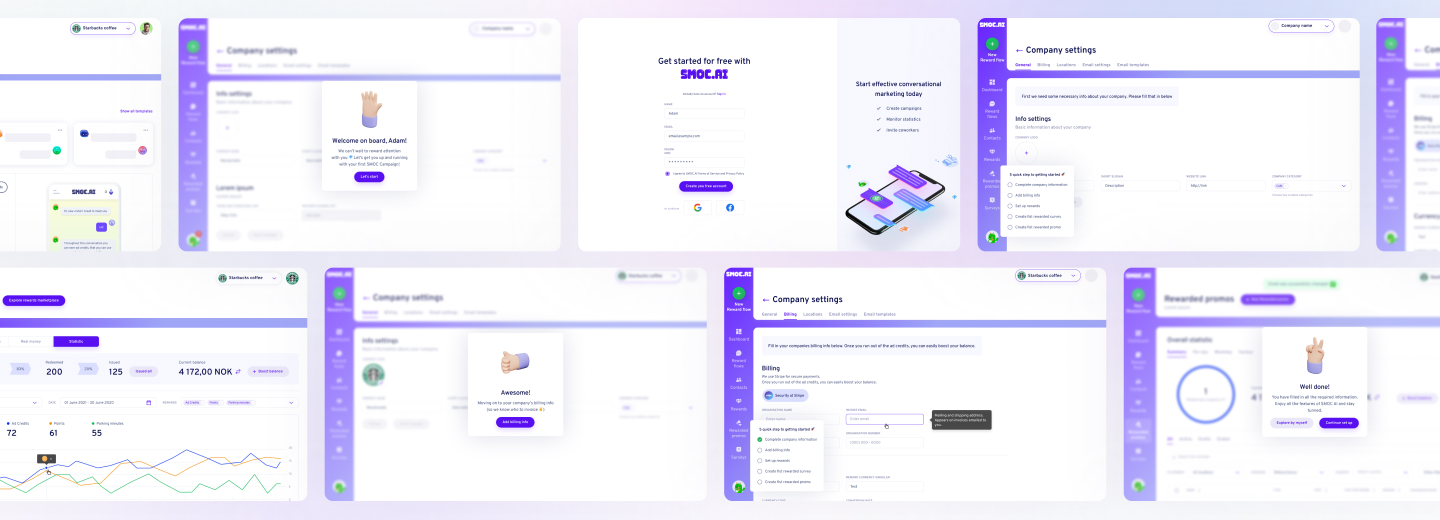Receiving significant investment funding brings to propelling your startup into growth mode. However, scaling a startup is not merely about expanding rapidly; it involves strategic decisions that align resources with burgeoning opportunities. Now more than ever, let’s delve deeper into transforming that potential into a robust plan, focusing on critical facets like technology, customer acquisition, and market adaptation to sustain momentum.
Find in our article the techniques startup owners apply when building their products and bringing them to fast-paced scaling.
what’s in the article
- The Concept of Scaling a Startup
- How to Understand When Your Startup is Ready to Scale?
- Key Elements of a Startup Scaling Strategy
- Hiring Strategy for a Scalable Team
- Scaling the Development Process
- Market Release Process
- How to Avoid Common Mistakes When Growing Your Startup
- Conclusion
The Concept of Scaling a Startup
Scaling a startup is the strategic pursuit of growth through effective resource alignment and intentional expansion. Successful scaling isn’t just about seizing opportunities; it’s about creating a sustainable, scalable model. This model should adapt seamlessly to changing market conditions while maintaining the essence of your startup’s foundational vision.
Embedded in the nuance of scaling is the understanding that an objective, data-driven strategy is paramount to navigating unknown domains, capitalizing on market potential, and propelling forward with assured steps toward disruption.
How to Understand When Your Startup is Ready to Scale?
It’s essential to gauge readiness via a mixture of quantitative metrics, market analysis, and team strength in order to understand how to scale a startup rightly. Consider indicators such as consistent revenue growth, robust product-market fit, and the presence of a reliable operational foundation. These elements are pivotal in confirming that your startup is positioned to embrace the exhilarating journey of expansion without compromising its core stability.
Revenue Growth
Revenue growth is not only about increasing sales — it’s about creating systems that consistently deliver your startup’s unique value proposition which is needed by your customers. Establishing a robust sales pipeline, enhancing customer engagement, and adopting adaptive pricing strategies can drive substantial financial gains and elevate your market position.
Fostering a culture of experimentation and agile learning allows startups to identify new revenue streams. By remaining vigilant to consumer trends and technological advancements, your startup can anticipate shifts quickly and precisely.
Product-Market Fit Validation
Achieving product-market fit marks the moment when your offering resonates with your target audience, proving there is genuine demand for your product or service. It’s a dynamic interplay of feedback loops, iterating based on customer insights, refining the offering, and realigning strategies.
This principle is not an overnight achievement but a continuous milestone that informs a startup’s trajectory. It requires a keen understanding of consumer needs and an adaptable mindset to pivot when necessary, thus unlocking new pathways for meaningful growth and expansion. The journey towards achieving product-market fit demands a dedication to empathy-driven development. By engaging with your audience meaningfully and leveraging analytical tools, you can fine-tune your value delivery to meet market demands unerringly.
Strong Operational Processes
Streamlined operations ensure startup resources are used most efficiently. These processes act as a catalyst for growth. By implementing disciplined systems, startups enhance predictability across their operations, leading to a culture of persistent innovation while maintaining quality, transparency, and a commitment to core values.
The profound impact of strong operational processes cannot be overstated; they are the blueprint of how a company functions, allowing everything from resource allocation to project execution to be consistently optimized, which is crucial for sustainable expansion and profitability. As you refine these, remember that efficiency is inseparable from achieving remarkable growth.

Looking to Build an MVP without worries about strategy planning?
EVNE Developers is a dedicated software development team with a product mindset.
We’ll be happy to help you turn your idea into life and successfully monetize it.
Key Elements of a Startup Scaling Strategy
Developing a robust scaling strategy requires a balance of innovation, resource optimization, strategic partnerships, and timing. These critical elements work synergistically to propel growth and ensure that your startup not only survives but thrives in a dynamic marketplace.
In crafting a successful scaling strategy, consider your “market fit”. This involves not just a deep understanding of your product’s value proposition but also an insight into current market trends. At this stage, the integration of the right technology and scalable infrastructure becomes the most important task.
Market Research
Comprehensive market research is the most important step in scaling a startup, offering clarity on industry dynamics and customer behaviour. When conducting research, you need to gather particular data to make it useful when scaling the product. You need to understand who your customers are, their needs, preferences, and purchase behaviour to build an offer with the most value. By evaluating competitors’ strengths and weaknesses you can uncover opportunities and threats and form your own distinct features and power points.
Aside from internal evaluations, scaling startups should define the potential of the market and its trends to anticipate changes and adapt strategies accordingly. Assess the size and growth potential of your market to align strategies effectively and lessen risks.
Focusing on thorough market research allows you to craft informed strategies that align with evolving market dynamics. Continually refining your market insights ensures responsiveness to customer needs and proactive positioning ahead of competitors.
Select Core Metrics for Growth
Choosing the right metrics is crucial to scaling a startup, guiding data-driven decisions and sustaining growth. There are plenty of different metrics for different types of products, though here are the most common ones that can help any business to evaluate its growth trajectory.
- Customer Acquisition Cost (CAC): how much you spend to acquire each customer.
- Customer Lifetime Value (CLV): the total value a customer brings to your business.
- Monthly Recurring Revenue (MRR): the stable revenue generated monthly.
- Churn Rate: how frequently customers stop interacting with your product or service.
- Net Promoter Score (NPS): customer satisfaction and loyalty.
These metrics provide insights into your business’s health and help prioritize growth initiatives effectively. They empower startups to allocate resources intelligently and enhance operational efficiencies.
Consult an Expert
Engaging with an industry expert, be it a growth strategist or seasoned mentor, ensures that your startup’s path is meticulously planned. These professionals bring a wealth of experience, having guided other fledgling businesses towards achieving remarkable success, and can offer tailored strategies that resonate with your unique vision and challenges.
Consulting industry experts is not merely about seeking advice; it is an investment in your startup’s future. By understanding complex growth dynamics, these advisors can help fine-tune your approach, aligning your strategies with realistic market conditions and fostering sustainable scaling. An expert’s perspective serves as an invaluable asset to unlocking your startup’s full potential. Their insights shed light on possible pitfalls and overlooked opportunities that can propel your business forward. Embracing external expertise not only enhances your strategic clarity but also accelerates your journey toward achieving unparalleled growth success.

Proving the Concept for FinTech Startup with a Smart Algorithm for Detecting Subscriptions

Scaling from Prototype into a User-Friendly and Conversational Marketing Platform
Hiring Strategy for a Scalable Team
The cornerstone of scaling a startup lies within the construction of its team. Deloitte’s research revealed that companies focusing on hiring for cultural fit tend to achieve greater long-term success. This concept underscores the importance of aligning potential employees with your startup’s core values, passion, and mission.
So, it’s vital to recognize that today’s candidate’s experience isn’t restricted to technical prowess. Hiring a dedicated team that’s adaptable to the evolving needs of the startup requires looking beyond the resume. Keep an eye out for individuals who display resilience, entrepreneurial spirit, and the capacity for problem-solving.
Scaling the Development Process
Unlocking the potential of your startup’s development lies in elevating your team’s capabilities, vision, and execution. To achieve sustainable growth, integrating agile methodologies seamlessly enhances team collaboration and fosters innovation. This approach allows for continuous adaptation to market demands, ensuring your startup remains resilient and competitive.
Creating and Managing a Product Roadmap
Creating a robust product roadmap forms the backbone of your startup’s scaling strategy. Visionaries emphasize how paramount a well-crafted roadmap is for aligning team efforts with company goals, ensuring consistent momentum.
Today, it’s not just about having a mere checklist — it’s about building the company’s collective vision, leveraging input from across departments, and translating those into actionable and prioritized initiatives. This requires attention to the market pulse, ensuring that the roadmap isn’t a static document but a dynamic beacon of potential, equipped to pivot as necessary, without deviating from the core company mission. A carefully nurtured roadmap empowers teams to navigate challenges efficiently while remaining aligned with overarching growth ambitions.
Choose the Right Tech Stack
Selecting the optimal tech stack is foundational to scaling your startup effectively and sustainably. The right technology choices fortify your startup with resilience and adaptability. Stack effectiveness often depends on several factors.
- Scalability: Ensure your stack can support future growth and increased user demands.
- Flexibility: Opt for versatility to adapt to evolving requirements and innovations.
- Security: Prioritize a stack that offers robust security features to protect data integrity.
- Community Support: A strong, active community ensures better support and quicker troubleshooting.
- Cost Efficiency: Consider long-term costs, aiming for a stack that suits your budget without compromising quality.
Effective stack selection empowers your team to innovate, enhance product offerings, and exceed customer expectations.
Develop and Implement New Features
In the dynamic landscape of startups, developing and implementing new features is crucial for sustaining competitive advantage and engaging users effectively. It breathes fresh life into products, providing opportunities to meet evolving user expectations.
When planning to introduce new features, it’s vital to leverage comprehensive market analysis data to ensure a harmony of customer wants, technological feasibility, and the company’s vision for growth. This approach not only aligns with strategic objectives but also maximizes user satisfaction, engagement, and retention.
Additionally, consistent feedback loops through beta testing and agile methodologies allow startups to refine and enhance features before a full product rollout. The importance of collaboration between cross-functional teams—ranging from development to marketing—cannot be overstated as they collectively innovate solutions that propel the startup toward achieving its milestones.
Test and Validate the Result
User experience should always lead the evaluation process. Engage your team in creating scenarios to simulate real-world usage, allowing for unanticipated challenges to surface. Such proactive measures ensure the crafted solutions truly cater to market demands, reinforcing user satisfaction and trust in the brand. By meticulously analyzing test data, startups can gain actionable insights, optimizing product performance and maintaining relevance.
Market Release Process
Launching a startup product requires careful management, a symphony of strategic planning, market analysis, and agile execution. Success hinges on aligning launch strategies with market dynamics, ensuring a seamless transition from development to public availability, poised to seize market opportunities.
Monitoring KPIs Relevant to Scale
Embarking on the journey of scaling a startup demands an incisive focus on key performance indicators (KPIs) that align with your specific growth trajectory, ensuring resources are effectively utilized.
Identifying the right KPIs requires analysis tailored to your industry. These metrics serve as essential guides to monitor critical aspects influencing company growth, ranging from customer acquisition to operational efficiency. Standard KPIs may include revenue growth rate, customer lifetime value, and retention rate, highlighting the brand’s vitality and prospects.
An analytical approach towards KPIs enables scaling not as a frenzied chase but as a measured stride towards enduring success. By integrating KPIs seamlessly into your strategic framework, you’ll cultivate a culture of continuous assessment and adaptive strategies. This proactive alignment not only gauges business health but also fuels insights that propel decisive action in scaling mountains.
Collect Customer Feedback After Product Improvement
Gathering customer feedback post-improvement is critical in understanding the impact and efficacy of your efforts. Evaluating this feedback allows you to refine the product further, optimizing user satisfaction and engagement. Different types of feedback gathering are done with various tools and techniques.
- Use Surveys: Deploy targeted surveys to capture detailed customer opinions on new features.
- Conduct Interviews: Engage directly with select users to gain in-depth insights.
- Analyze Live Chat Transcripts: Review conversations for real-time feedback on improvements.
- Monitor Social Media: Observe customer discussions and sentiments about product changes.
- Utilize Feedback Tools: Implement feedback widgets directly on your application or website.
Continuous iteration based on genuine customer insights ensures you align your product with their evolving needs.
How to Avoid Common Mistakes When Growing Your Startup
Embarking on a journey of expansion can sometimes lead to potential pitfalls if not approached carefully. To steer clear, one must maintain robust communication channels and regularly re-evaluate growth strategies alongside team capabilities, and market research ensuring that every facet aligns with overarching objectives. This proactive stance averts scalability issues resulting from misallocation of resources.
Terms like “overextension” and “overexpansion” serve as cautionary tales, underscoring the need for methodical scaling to sustain long-term success.
Find out What you Really Need for your Startup Scaling
As you embark on the dynamic journey of scaling a startup, the first step is to succinctly evaluate the core competencies that define your business. This involves delving into the unique elements of your startup’s DNA, which if nurtured with well-aligned resources, can propel you towards achieving scalable success.
Ensure scalability aligns with core competencies. Examine which aspects of your business model have been instrumental thus far—be it your product innovation, customer service excellence, or proprietary technology—and assess their scalability potential.
Moreover, this strategic assessment should extend to human capital – not only must the right skills be attracted to propel continuous growth, but cultivating a visionary leadership team is imperative. As you grow, harness these elements to amplify your startup’s impact on a broader market.
Your journey hinges on the disciplined execution of scalable strategies established in the context of today’s rapidly evolving technological landscape. Instilling an ethos of agility within your company will not only guard against disruption but will foster an adaptive culture, priming your startup for sustainable, exponential growth.
Collect Customer Feedback After Product Improvement
Effective financial management is paramount when scaling a startup, ensuring sustainable growth and the capacity to seize emerging opportunities. A disciplined approach to financial stewardship shields your startup from market volatility and enhances competitive dynamics.
- Allocate Financial Resources Wisely: Focus on strategic investments that align with scalability goals, fostering both immediate growth and long-term resilience.
- Create a Detailed Budget Plan: Develop an adaptable budget that factors in unforeseen expenditures.
- Diversify Revenue Streams: Explore multiple revenue channels to mitigate risks.
- Engage with Financial Advisors: Collaborate with financial consultants to use their expertise in navigating complexities.
Ultimately, clear financial transparency creates the foundation for informed decision-making and stakeholder trust, imperative for scaling efforts.
Faster Time to Market Instead of Quality
In pursuing a speedy market entry, startups often grapple with maintaining product quality. Startups can evaluate customer needs and prioritize understanding immediate customer demands to meet essential expectations swiftly with rapid iterations. Note that all iterations should be done based on real actual feedback.
Using Agile practices can help to adapt and evolve, optimizing both speed and resource allocation. Especially that is vital when focusing on MVP creation to reduce development time while ensuring essential utility. Prioritizing speed over perfection requires a strategic balance to preserve brand reputation. Innovative agility should never forsake the core value proposition, which ultimately enhances long-term growth potential.

Need Checking What Your Startup Current Valuation?
EVNE Developers is a dedicated software development team with a product mindset.
We’ll be happy to help you turn your idea into life and successfully monetize it.
Conclusion
Scaling a startup greatly depends on strategic planning rather than a one-time vision. As you embark on this exhilarating journey, remember that balancing growth with sustainability is paramount. By leveraging data-driven insights, enhancing operational efficiency, and preserving organizational vision, your startup can thrive even amidst rapid expansion.
Push the boundaries of innovation while safeguarding the intrinsic values that define your brand and the decision to scale your startup. Remember, every challenge encountered is an opportunity for profound transformation, fortifying the business’s foundation in the process of startup software development.
Startup scale up involves strategic efforts that entail aligning resources with the demands of increasing market needs. This requires a founder’s understanding of product-market fit as a precursor to scaling.
The decision to scale your startup should align with strategic milestones that signify readiness and sustainable growth potential. In addition, it is better when you understand what is a scalable startup and what steps you should take on its way. You should have consistent revenue growth on a validated market and a reliable base of users. Check your resources, plan the way forward and strategize business scaling to ensure business continuity and stability.
Absolutely, scaling a startup without external funding is possible. Prioritize revenue reinvestment into growth-driving areas such as product development, marketing, and talent acquisition. Focusing on increasing operational efficiencies through streamlined processes and technology adoption can further bolster expansion without diluting equity ownership. Explore customer-funded growth strategies, such as pre-orders or subscriptions, which allow for immediate reinvestment back into scaling initiatives without external dependency.
First and foremost, one must implement metrics like customer acquisition rates, revenue growth, and operational efficiency, ensuring that these indicators align with broader strategic objectives. Furthermore, they will provide insights into areas requiring adjustments or intensification. Additionally, gauging success can involve a comprehensive assessment of team scalability. As operations expand, consider how well your workforce adapts to new challenges, along with their productivity and innovation levels—a critical element in achieving a scale-up strategy for startup and sustainable growth.

About author
Roman Bondarenko is the CEO of EVNE Developers. He is an expert in software development and technological entrepreneurship and has 10+years of experience in digital transformation consulting in Healthcare, FinTech, Supply Chain and Logistics.
Author | CEO EVNE Developers


















